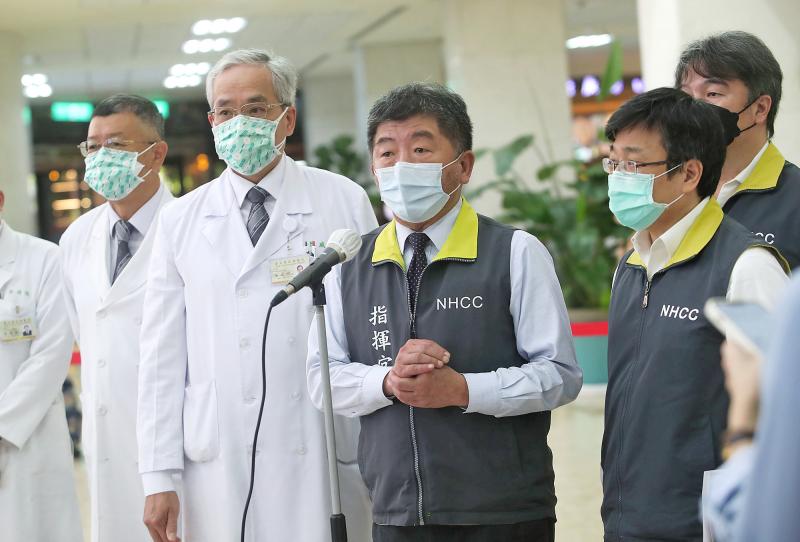The people who can be prescribed Paxlovid, an oral antiviral drug for treating COVID-19, now includes pregnant women, the Central Epidemic Command Center (CECC) said yesterday.
Centers for Disease Control Deputy Director-General Philip Lo (羅一鈞), deputy head of the CECC’s medical response division, said that pregnant women can now be given a Paxlovid prescription, although the prescribing doctor should thoroughly explain the potential benefits and risks of taking the drug during pregnancy, and obtain the woman’s consent before prescribing it.
A specialist meeting on Tuesday that included representatives from the Taiwan Association of Obstetrics and Gynecology and the Taiwan Society of Perinatology decided that pregnant women, especially those with underlying health conditions, have a higher risk of complications or severe illness after contracting COVID-19, Lo said.

Photo: CNA
However, there is not enough clinical data on using Paxlovid to treat pregnant women, and the recommendations from regulatory agencies based on animal experiments are inconsistent, which is why the patient must understand the potential benefits and risks of taking the drug, he said.
If the doctor determines that the benefits outweigh the risks, clearly informs the infected pregnant woman of her situation, and obtains her consent, the drug can be prescribed, Lo said.
Another oral antiviral, molnupiravir, is not recommended for pregnant women, he added.
Lo said that some COVID-19 patients have complained that they were not prescribed Paxlovid, but there are four eligibility criteria: being age 12 or older; weighing at least 40kg; five days having passed since the onset of symptoms and no supplemental oxygen required; having an illness with mild to moderate symptoms; and having at least one of the 14 indicators for a high risk of developing severe symptoms.
The criteria, which are similar to those in other countries, are flexible, he said, adding that doctors need to know all of a person’s medications, because Paxlovid should not be taken with some drugs.
The National Health Insurance (NHI) Administration has added a mechanism to its NHI Medi-Cloud System that automatically notes the drugs that should not be taken with Paxlovid, so doctors can check for potential drug interactions by entering the patient’s NHI number, Lo said.
Paxlovid is not suitable for all people with COVID-19, so doctors should carefully assess each patient’s condition and drug use before prescribing the drug, he said.

Taiwan is to have nine extended holidays next year, led by a nine-day Lunar New Year break, the Cabinet announced yesterday. The nine-day Lunar New Year holiday next year matches the length of this year’s holiday, which featured six extended holidays. The increase in extended holidays is due to the Act on the Implementation of Commemorative and Festival Holidays (紀念日及節日實施條例), which was passed early last month with support from the opposition Chinese Nationalist Party (KMT) and Taiwan People’s Party. Under the new act, the day before Lunar New Year’s Eve is also a national holiday, and Labor Day would no longer be limited

Taiwan is to extend its visa-waiver program for Philippine passport holders for another year, starting on Aug. 1, Minister of Foreign Affairs Lin Chia-lung (林佳龍) said on Friday. Lin made the announcement during a reception in Taipei marking the 127th anniversary of Philippine independence and the 50th anniversary of the establishment of the Manila Economic and Cultural Office (MECO) in Taiwan, the Ministry of Foreign Affairs said. The decision reflected Taiwan’s commitment to deepening exchanges with the Philippines, the statement cited Lin as saying, adding that it was a key partner under the New Southbound Policy launched in 2016. Lin also expressed hope

Costa Rica sent a group of intelligence officials to Taiwan for a short-term training program, the first time the Central American country has done so since the countries ended official diplomatic relations in 2007, a Costa Rican media outlet reported last week. Five officials from the Costa Rican Directorate of Intelligence and Security last month spent 23 days in Taipei undergoing a series of training sessions focused on national security, La Nacion reported on Friday, quoting unnamed sources. The Costa Rican government has not confirmed the report. The Chinese embassy in Costa Rica protested the news, saying in a statement issued the same

Temperatures in New Taipei City’s Sindian District (新店) climbed past 37°C yesterday, as the Central Weather Administration (CWA) issued heat alerts for 16 municipalities, warning the public of intense heat expected across Taiwan. The hottest location in Taiwan was in Sindian, where the mercury reached 37.5°C at about 2pm, according to CWA data. Taipei’s Shilin District (士林) recorded a temperature of 37.4°C at noon, Taitung County’s Jinfeng Township (金峰) at 12:50 pm logged a temperature of 37.4°C and Miaoli County’s Toufen Township (頭份) reached 36.7°C at 11:40am, the CWA said. The weather agency yesterday issued a yellow level information notice for Taipei, New